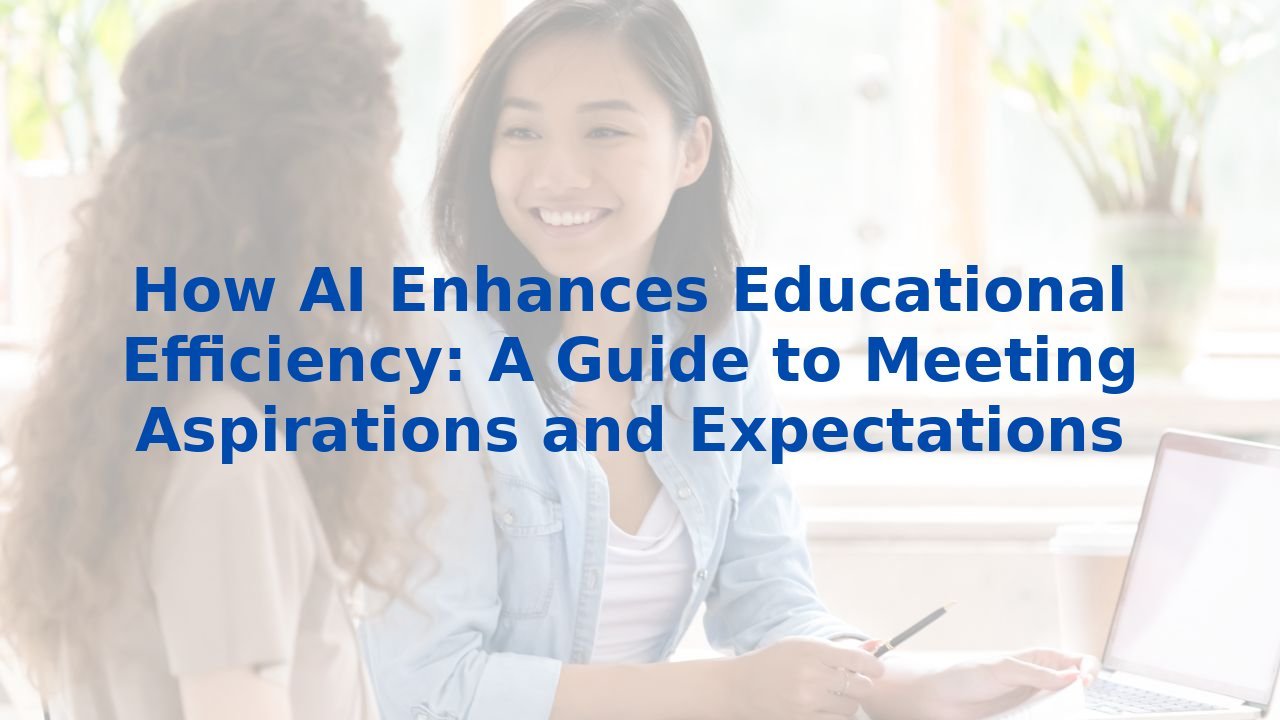How AI Enhances Educational Efficiency: A Guide to Meeting Aspirations and Expectations
How AI Enhances Educational Efficiency: A Guide to Meeting Aspirations and Expectations
Introduction
Artificial Intelligence (AI) is not just a futuristic concept; it is reshaping the educational landscape as we know it. As the aspirations of children blend with the expectations of their parents, AI stands at the forefront of educational development, driving efficiency in ways previously unimaginable. This blog post dives into how AI can enhance various educational processes, underscoring the critical role of effective employee training in this transformation.
Better Decisions with AI
AI's capacity for data-driven decision-making is one of its most significant advantages in education. It has the power to sift through vast amounts of data to unearth insights that directly impact teaching methodologies. For instance, AI analyses can help identify learning patterns and predict how students are likely to perform, enabling educators to step in proactively. This early intervention not only aids student success but also streamlines educational methodologies, ensuring that each student's unique needs are addressed.
Efficiency and Productivity Gains
Imagine a world where repetitive tasks are seamlessly managed by AI—welcome to the future of education. AI tools are adept at automating administrative burdens such as grading, attendance tracking, and report generation. This automation liberates educators to focus on what truly matters: fostering learning and engagement. Furthermore, AI's ability to facilitate collaboration among educators—through real-time feedback and personalized learning plans—creates a more dynamic and productive educational environment.
Improved Speed of Business
In a world where speed is essential, AI shines brightly. It empowers educators to make informed decisions swiftly and implement necessary changes without delay. Leveraging AI can mean generating customized learning materials and assessments almost instantaneously, accelerating the time it takes to develop lesson plans. This agility is indispensable in keeping educational institutions competitive and responsive in today’s fast-paced climate.
New Capabilities and Business Model Expansion
The introduction of AI doesn't just boost efficiency—it also opens new avenues for educational institutions to expand their business models. AI-driven platforms enable the personalization of learning experiences, which can attract a broader student demographic and ultimately increase revenue streams. Moreover, the capacity to integrate with other sectors, such as tech and healthcare, means that educational institutions can offer a richer, more comprehensive learning experience that is increasingly demanded by students and parents alike.
Benefits of Training Employees for AI
The undeniable advantages that AI brings to educational efficiency must be paralleled with a robust training program for employees. It’s not just about implementing AI tools; educators need to be equipped with the skills to interpret AI-generated data and to leverage it for enhanced teaching methods. By investing in comprehensive training programs, educational institutions can ensure they maximize the potential AI has to offer, leading to not only improved efficiency but also elevated student outcomes. For those interested in fostering AI skills within their workforce, exploring AI training programscan be a vital first step.
Conclusion
The integration of AI in the educational sector represents a pivotal transformation aimed at not just improving efficiency but also tailoring education to meet the diverse needs of students. By facilitating better decision-making, increasing productivity, and expanding business capabilities, AI is set to redefine how education operates. However, its success hinges on prioritizing employee training, ensuring that educators are well-prepared to navigate this new terrain. As educational institutions look to the future, embracing AI will be essential in fulfilling the aspirations of students and the expectations of their families alike.
Education is at a crossroads, and the journey ahead is illuminated by the power of AI. Change is not just necessary; it is inevitable.
This exploration provides a holistic view of how AI can redefine efficiency within educational processes. It is a call to arms for educators to embrace technology, ensuring they stay ahead in an ever-evolving landscape, empowering both teachers and students alike to thrive.



